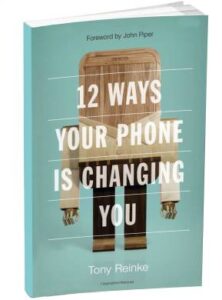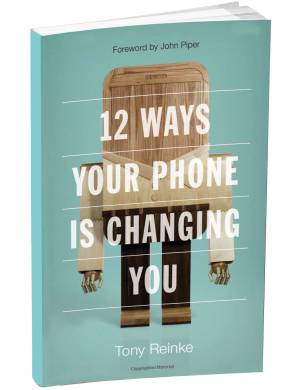 Tony Reinke calls himself a Christian and a non-profit journalist with an interest to explore how technology affects our relationship with God and one another. All his claims are evident in his books—the subject of his research is technology, perspective is Christian and method is that of a journalist. 12 Ways Your Phone is Changing You is the latest addition to his research on the subject, the other two being: Lit! A Christian Guide to Reading Books and Newton on the Christian Life: To Live is Christ.
Tony Reinke calls himself a Christian and a non-profit journalist with an interest to explore how technology affects our relationship with God and one another. All his claims are evident in his books—the subject of his research is technology, perspective is Christian and method is that of a journalist. 12 Ways Your Phone is Changing You is the latest addition to his research on the subject, the other two being: Lit! A Christian Guide to Reading Books and Newton on the Christian Life: To Live is Christ.
12 Ways begins with placing technology in the bigger story of our movement from garden to the city. Tony then invites people of God for “renewed biblical contemplation” in light of the technological invention so that Christian theology of technology can be explored. Tony himself gives nine “key realities” of what this theological exploration looks like. These are: technology modifies creation, it pushes back the results of the fall, it establishes human power, it helps to edify souls, technology upholds and empowers our body, it gives voice to human autonomy, God governs every human technology, technology shapes every relationship, and it shapes our theology.
Then Tony goes on to explain the 12 ways in which he thinks our phone is changing us.
We are addicted to distraction: He says that distraction is not a new thing, it has always been there (that’s why we don’t need to return to pre-digital age). He divides distractions into godly and ungodly, sanctified and unsanctified, soul-filling and soul-deadening, necessary and worldly, unavoidable and avoidable distractions. He calls his readers to “learn to apply distraction management in every situation” (50), and “fight for undistracted hearts” before God (51). At the end, Tony gives ten “diagnostic questions” we can ask ourselves to gauge if our distractions are unhealthy.
We ignore our flesh and blood: Our online activity allows us an opportunity to preach love while actually lacking love in our actions. In other words, as Tony puts it beautifully, “In the smartphone age, when our cognitive actions are separated from our bodily presence, we tend to overprioritize the relatively easy interactions in the disembodied online world and undervalue the embodied nature of the Christian faith” (61). Again, he says, “The Christian’s challenge is to love not in tweets and texts only, but even more in deeds and physical presence” (60).
We crave immediate approval: In a digitized world, we are more prone to seek our approval from others. Phones have helped create a world with hyper abundance of digital images, where “celebrities could be created, rejected, and replaced” (68). With real-life examples, author proves that such efforts demand high cost and yet leaves us hungry and dissatisfied. Tony reminds us to seek the glory of God than the glory of man.
We lose our literacy: Tony doesn’t mean here that the digital age has made us illiterate, but that it has brought in “aliteracy” — “a digital skimming that is simply an attempt to keep up with a deluge of information coming through our phones rather than slowing down and soaking up what is most important” (85). Rather than blaming our phones, Tony points finger at our own lack of self-control, and urges to set our affection on God’s Word. In contrast to the “superficial chitchat of a cocktail party” we need to enter into “a relational reading” of the Word of God (89).
We feed on the produced: Tony calls us to observe a simple fact—that all the content on our phones is intermediated. This leaves us prone to be used as consumers by the corporate houses, who make money by keeping us glued to our smartphones. This demands that we show “discernment and discretion” (97), and become filters for what we feed, share, tweet.
We become like what we “Like”: Humans search for conformity. We become like what we worship. “The object of our worship is the object of our imitation. God designed this inseparable pattern. What we want to become, we worship. And what we worship shapes our becoming”(113). When we give priority to our phones, our new idols, we fall into the error of reverse adaptation – “submitting humans ends to the available technological means” (115). Tony suggests that we separate means and ends. The call is to beware of the sin of “techno-idolatry” (116), and return to our original calling to image Christ.
We get lonely: Though more connected than ever, we live more isolated than ever.“Isolation is both the promise and the price of technological advance” (121). It is a trap laid by those propelling consumerism through individualism for their monetary benefits. The more isolated people are, the bigger the need to fill the hole in their lives, and the more the hunger to fill that hole by products. That’s a vicious cycle!
We get comfortable in secret vices: Smartphones makes porn more discreet and readily available. They capitalize on our curiosity in sexual matters and make us reach out for forbidden curiosities. The call is to set our hearts on things above, and not on things below (Col 3: 1-2)—to live the visible with our eyes fixed on the invisible, and even to employ our imagination in service of eschatological glory rather than sexual fantasies.
We lose meaning: In the digitized world, people have been warning of information overload. Tony rather thinks that the elephant in the room is our need to “stay relevant and entertained”(147). The filtering of news by some“gatekeepers” like Twitter, Facebook, has made us affected with “neomania, an addiction to anything new within the last five minutes” (148), and plagued us with an anxiety of missing out. We need to “identify and cherish wisdom” (150). Wisdom, in digitized world, means slowing down to digest what we have chewed, to “strive for fearful obedience over frivolous information” (150), and to “embrace our freedom in Christ, as we step back from the onslaught of online publishing and the proliferation of digital sages” (151). The most precious wisdom is not found in gathering of more information, but in coming to Jesus Christ.
We fear missing out: As we spend more time on social media, we fall prey to unhealthy comparison, our pain and suffering seem larger than theirs, envy accentuates, we suffer from Fear Of Missing Out (FOMO). We desire to live the lives of others and not ourselves, returning to our phones again and again. Tony invites to be delivered from the false FOMO, but warns of legitimate FOMO—fear of missing out eternally. The way out of this FOMO is to surrender our lives to Jesus.
We become harsh to one another: Mobile phones offer us opportunity for whistle-blowing, but also to settle personal scores by posting comments that throw dirt on others. Tony compares trolling with slander, and draws out some principles to settle our disagreements from James 4 and the ninth commandment. “We must have courage to turn away from online slander or to confront it as slander” (170). At the end of the chapter, the author provides some practical questions to ask ourselves before we begin to tweet something about someone.
We lose our place in time: Phones offer us a timeless and space-less world. The temptation to remain in that world could be dangerous, especially for Christians, whose faith is based in the events of history.
In conclusion, Tony calls us for “Living Smartphone Smart.” He lays before the readers general consequences of overuse of smartphone, tips to avoid falling into the trap of doing nothing and the effects of phone usage on our bodies. In the epilogue, the author recounts his personal experiences of being addicted to iPhone and other technological devices, and how writing this book has changed him.
To some, Tony’s approach to technology may seem largely negative. However, Tony specifies time and again that technology is not worthless, but that it is changing its users and that we need to theologically reflect on those changes. The book is a result of in-depth research, interviews with renowned theologians, pastors, ministers and lay persons, and abounding in data to support Tony’s claims.
Though the immediate context of Tony’s research is that of America, the findings are very significant for Christian readers in South Asia, particularly India, which recently surpassed America to be the second-largest smartphone market in the world.






